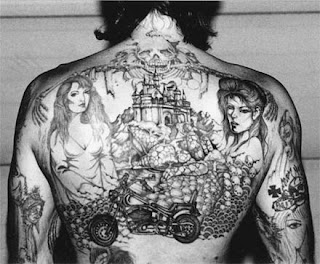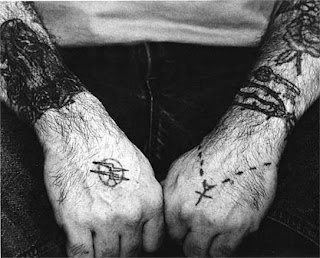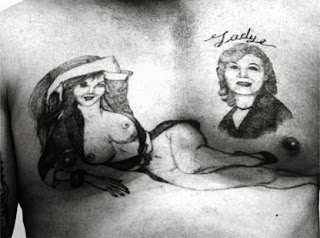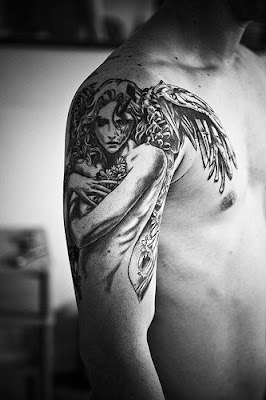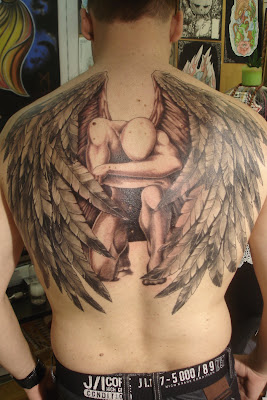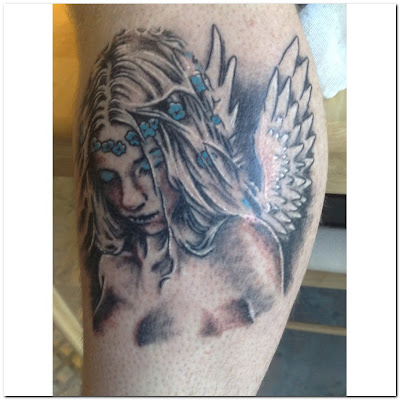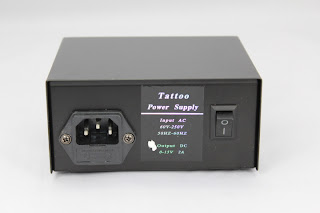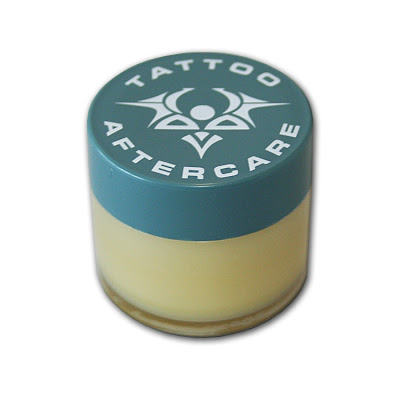Prison Tattoos
Tattooing in prisons has been around for just about as long as prisons have been around!, some of the prison tattoo designs and meanings are universal and some are unique to different countries and cultures, below I have listed some of the more popular prison tattoos along with their various meanings, and a brief narrative on how some of these tattoos are performed within the confines of the worlds prison walls.
Prison Tattoo Equipment
Prison-made
tattoos are a form of communication for inmates who live in a situation
that bans most other means of self-expression. These messages, which
are easily “read” by other inmates, tell a lot about the wearer,
including gang membership, status in prison, family relationships,
special life events, spiritual beliefs and personal values. - See more
at: http://thebluereview.org/prison-tattoos/#sthash.lnGz1iLj.dpuf
Prison-made
tattoos are a form of communication for inmates who live in a situation
that bans most other means of self-expression. These messages, which
are easily “read” by other inmates, tell a lot about the wearer,
including gang membership, status in prison, family relationships,
special life events, spiritual beliefs and personal values. - See more
at: http://thebluereview.org/prison-tattoos/#sthash.lnGz1iLj.dpuf
There are two standard type of prison tattoo pistols, the spinner and
the relay. The relay pistol is much better than the spinner rig-up and
is now more widely used. An inmate breaks down his most prized
possession, a radio, and removes the transistor. The thin copper wire is
then removed which is wrapped around a screw which provides an
automatic relay when powered up. The inmate must then somehow acquire
bristles from a wire brush from maintenance, and sharpen them to provide
the needle. The cylinder is made from a quality mechanical pencil and
the armature bar is made with a piece of flexible pallet band and dime
size magnet. The tattoo gun is then powered by the transistor of another
radio. So owning one of these tattoo "pistols" is quite costly and in
prison, "money" can be hard to come by!
[source]
Prison Tattoos & Meanings
A.C.A.B
 |
| A.C.A.B tattoo |
ACAB is an acronym very commonly found inked on the bodies of British prisoners. It stands for All Cops Are Bastards. Some with the tattoo claim that ACAB stands for 'Always Carry A Bible', but it's widely believed that these are just people who regret their decisions or are trying to make a good impression. It seems like it must make things easy for the cops in England, having all of the criminals self-identify with this tattoo. It is often found on the knuckles. These days many British youths who have never gone to prison have ACAB tattoos to signify their willingness to go to prison for their crew or gang.
Clock With No Hands
 |
| "Clock with no hands" prison tattoo |
ACAB
is an acronym very commonly found inked on the bodies of British
prisoners. It stands for All Cops Are Bastards. Some with the tattoo
claim that ACAB stands for 'Always Carry A Bible', but it's widely
believed that these are just people who regret their decisions or are
trying to make a good impression. It seems like it must make things easy
for the cops in England, having all of the criminals self-identify with
this tattoo. It is often found on the knuckles. These days many British
youths who have never gone to prison have ACAB tattoos to signify their
willingness to go to prison for their crew or gang.
Read more at
http://izismile.com/2013/08/02/the_meaning_behind_various_prison_tattoos_15_pics.html#FhePvoPuxlIx5Vr2.99
ACAB
is an acronym very commonly found inked on the bodies of British
prisoners. It stands for All Cops Are Bastards. Some with the tattoo
claim that ACAB stands for 'Always Carry A Bible', but it's widely
believed that these are just people who regret their decisions or are
trying to make a good impression. It seems like it must make things easy
for the cops in England, having all of the criminals self-identify with
this tattoo. It is often found on the knuckles. These days many British
youths who have never gone to prison have ACAB tattoos to signify their
willingness to go to prison for their crew or gang.
Read more at
http://izismile.com/2013/08/02/the_meaning_behind_various_prison_tattoos_15_pics.html#FhePvoPuxlIx5Vr2.99
A tattoo of a clock with no hands is one of the subtler prison tattoos you might come across. It means 'doing time' and is representative of a long prison sentence. Prison inmates have an interesting view of time, especially those serving long sentences. Prisoners view time as somewhat meaningless, which is what this tattoo is meant to represent. Prisoners will often choose not to count the days they are in prison. The clock tattoo can come in a few forms, it can be the face of a wall clock or a grandfather clock. Sometimes the tattoo is even done as a wristwatch, straps and all. Clocks in general are a popular tattoo and they don't all represent prison life: always look to see if the clock has hands
[source]
Teardrop Tattoo
One of the most widely recognized prison tattoos is the teardrop. But the meaning of the teardrop varies geographically. In some places a teardrop represents a long prison sentence, in other places the teardrop represents that the bearer committed a murder. Sometimes the teardrop is empty. This can symbolize an attempted murder, or that one of the inmate's friends was murdered and that they are seeking revenge.
Rappers and other celebrities have popularized teardrop tattoos, which has led to many non-convicts getting the prison tattoos just for the 'hard' look it creates. If you are considering getting a teardrop tattoo, be warned: If you go to prison for the first time while sporting an unauthentic prison tattoo, you will make a lot of enemies, real fast!
Cross on the Chest (Russia)
 |
| Russian Prison Tattoo "Chest Cross" |
In the Russian prison system, a tattoo on the chest symbolizes a 'Prince of Thieves'. This is the highest rank a Russian convict can achieve, and these are generally worn by high-ups in the mob. Russian convicts have one of the most intricate tattoo cultures of any group of people. There are literally dozens of Russian criminal tattoos, each with it's own distinct meaning. For example, a man with stars on his knees does not bow down to any authority. A man with a tiger on his chest is aggressive towards the police. A web with a spider in it symbolizes a drug addiction. Bells symbolize freedom while roses mean a wasted youth. A manacle represents a 5-year prison term, while a bear is reserved for professional safe-crackers............ The list goes on and on.
Three Dots
 |
| "Three dots tattoo" |
The three dots tattoo is a very common prison tattoo that symbolizes 'mi vida loca' or 'my crazy life.' It doesn't symbolize any particular gang, but rather the gang lifestyle.
It's typically found on the hands or around the eyes. The three dots tattoo can also carry some religious significance, representing the holy trinity. Dot tattoos are often done using the stick-and-poke method. This is a home-made tattoo procedure that involves very rudimentary tools, like a pencil or a sewing needle. Almost any sharp objects can be used, and it's often whatever the inmates can get their hands on.
Prison Tattoos - Personal Stories
With tattoos dating back to age 13, this inmate was working toward a
“full shirt” of tattoos — chest, back and arms fully tattooed. The
Harley-Davidson Evolution motorcycle commemorates the beloved,
customized bike his ex-wife sold in their divorce.
This 24-year-old inmate got his small teardrop tattoo at age 15 and
says it means “somebody’s mother doesn’t have a son any more.” The dragon
and demon emerging from slits rendered in his chest (left and right)
are common prison tattoos and generally represent the wearer’s evil
nature breaking out and causing harm.
Lightning bolts on one side of this man’s neck and “Thank God I’m
White” on the other clearly announce his racist beliefs formed, he says,
during his 15 years in California prisons. Other tattoos include the
names of his children, opium poppies, the years of his three prison
terms, prison walls and bars, him “dreaming about my old lady” and his favourite tattoo — “In Memory of Mac and Annie,” his grandparents. In the
California prisons, he used to trade “a cap of weed” for a tattoo, and
crooked guards would bring in bottles of ink.
Lightning bolts symbolize “white power” and racist beliefs. The
crude cross and chain were applied while this inmate was incarcerated at
the old Idaho State Penitentiary (which closed in 1973), and the same
image was worn by all members of his prison clique.
This inmate had a reclining figure tattooed on his chest so that “no
matter how old or ugly I got, I’d still have a good-looking woman next
to me.” The portrait is of one of his five ex-wives. A repeat offender
rapist, the man has been in prison since 1976.
ACAB
is an acronym very commonly found inked on the bodies of British
prisoners. It stands for All Cops Are Bastards. Some with the tattoo
claim that ACAB stands for 'Always Carry A Bible', but it's widely
believed that these are just people who regret their decisions or are
trying to make a good impression. It seems like it must make things easy
for the cops in England, having all of the criminals self-identify with
this tattoo. It is often found on the knuckles. These days many British
youths who have never gone to prison have ACAB tattoos to signify their
willingness to go to prison for their crew or gang.
Read more at
http://izismile.com/2013/08/02/the_meaning_behind_various_prison_tattoos_15_pics.html#FhePvoPuxlIx5Vr2.99
ACAB
is an acronym very commonly found inked on the bodies of British
prisoners. It stands for All Cops Are Bastards. Some with the tattoo
claim that ACAB stands for 'Always Carry A Bible', but it's widely
believed that these are just people who regret their decisions or are
trying to make a good impression. It seems like it must make things easy
for the cops in England, having all of the criminals self-identify with
this tattoo. It is often found on the knuckles. These days many British
youths who have never gone to prison have ACAB tattoos to signify their
willingness to go to prison for their crew or gang.
Read more at
http://izismile.com/2013/08/02/the_meaning_behind_various_prison_tattoos_15_pics.html#FhePvoPuxlIx5Vr2.99 A tattoo of a clock with no hands is one of the subtler prison tattoos you might come across. It means 'doing time' and is representative of a long prison sentence. Prison inmates have an interesting view of time, especially those serving long sentences. Prisoners view time as somewhat meaningless, which is what this tattoo is meant to represent. Prisoners will often choose not to count the days they are in prison. The clock tattoo can come in a few forms, it can be the face of a wall clock or a grandfather clock. Sometimes the tattoo is even done as a wristwatch, straps and all. Clocks in general are a popular tattoo and they don't all represent prison life: always look to see if the clock has hands
A
tattoo of a clock with no hands is one of the subtler prison tattoos
you might come across. It means 'doing time' and is representative of a
long prison sentence. Prison inmates have an interesting view of time,
especially those serving long sentences. Prisoners view time as somewhat
meaningless, which is what this tattoo is meant to represent. Prisoners
will often choose not to count the days they are in prison. The clock
tattoo can come in a few forms, it can be the face of a wall clock or a
grandfather clock. Sometimes the tattoo is even done as a wristwatch,
straps and all. Clocks in general are a popular tattoo and they don't
all represent prison life: always look to see if the clock has hands
Read more at
http://izismile.com/2013/08/02/the_meaning_behind_various_prison_tattoos_15_pics.html#FhePvoPuxlIx5Vr2.99
Prison-made
tattoos are a form of communication for inmates who live in a situation
that bans most other means of self-expression. These messages, which
are easily “read” by other inmates, tell a lot about the wearer,
including gang membership, status in prison, family relationships,
special life events, spiritual beliefs and personal values. - See more
at: http://thebluereview.org/prison-tattoos/#sthash.lnGz1iLj.dpuf
Reciprocal
influences exist between prison and professional tattooing. For many
years, prison tattoos emulated the techniques of professional tattoo
artists. While the professional shops had access to tattoo machines as
early as the 1890s, prison tattoo artists relied on a similar hand-held
method that used a bundle of sewing needles affixed to a handle. Using
this crude set-up, a strong line could be worked that was very similar
to that created by the electric machine, which also used several
needles.
Tattoos made in this style have a heavy outline with little or no interior shading.
In the 1970s, prison tattoo artists began to use a single needle
(often affixed to simple electric motor); this method spawned a distinct
style of tattooing labeled “fineline” for the characteristic subtle
details of shading that result in an almost photo-realistic product.
This new look was noted by “outside” professional tattoo artists, who
adopted and popularized the all-black fineline style in the mid- to
late-1970s. It remains an important prison and mainstream tattoo style
today.
The photos in this exhibit are are from a collection shot by Peter
Wollheim in 1993. The subjects represent a broad range of ages (the
oldest inmate in the study was first locked up in 1938) and locations,
including federal and state prisons across Idaho and in many other
states.
- See more at: http://thebluereview.org/prison-tattoos/#sthash.lnGz1iLj.dpuf















